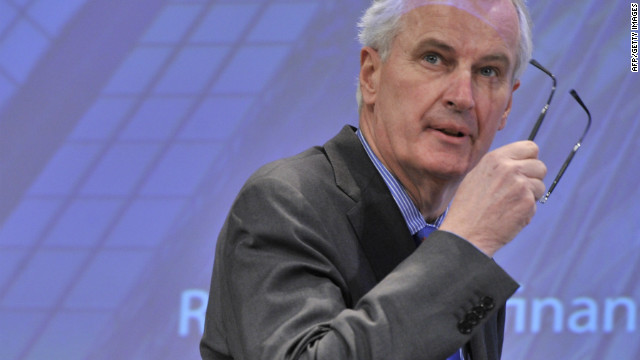
(Financial Times) -- EU finance ministers must
urgently dispel doubts over their "political will" to create a single
bank supervisor so talks do not drag on and upset "fragile markets", the
official spearheading the reforms has warned.
In a pointed intervention
ahead of a critical fortnight for the eurozone's nascent banking union,
Michel Barnier, the EU commissioner who oversees financial regulation,
told ministers: "Now is the time to decide."
The French commissioner's
plea came in a Financial Times interview where he backed a "maximum
ceiling" on bankers' bonuses relative to fixed pay, found fault with
banking union safeguards demanded by the UK, and argued EU treaties
could eventually be changed to reinforce the new supervision regime.
Banking union talks have
badly stalled in recent weeks as Germany, Sweden and others restate
fundamental concerns, ranging from the supervisor's powers to the
disenfranchisement of non-eurozone members. Some senior negotiators
expect the year-end deadline to be missed.
hile a German-led bloc
insists its priority is ensuring quality, there is growing frustration
in Brussels at alleged foot-dragging, especially since EU leaders
endorsed the framework and timetable. A meeting of finance ministers
next week will be an important test of whether a deal is possible in
2012.
While avoiding direct criticism, Mr Barnier said ministers received "loud and clear" instructions from two EU summits.
"We need to meet a
[December] deadline set by the heads of state, we need a political
decision and that is possible," he said. "There is no obstacle that is
insurmountable today. There is no decision that cannot be taken before
the end of the year -- if there is a political will.
"The markets are not
complacent; they remain vigilant and watchful . . . We need to deliver
now," he said, warning of the "fragile" situation.
Mr Barnier expresses
understanding for German worries -- namely the European Central Bank's
remit over small banks -- and Sweden's view that the current EU treaties
are a poor base for the reform, given the restrictions on the rights of
non-euro countries that join. Berlin also worries the legal constraints
make it hard to split ECB monetary and supervision roles.
Mr Barnier insists the
deal must be done on the basis of "good solutions in the existing
treaties". But he adds that a second step could involve changing primary
laws of the EU to make the banking union stronger. "Maybe we can
imagine that later on we can consolidate things, improve things," he
said.
He is less sanguine
about British demands for safeguards to stop the ECB dominating at the
European Banking Authority, the agency where supervisors co-ordinate EU
technical rules. Although some changes must be made, he is unconvinced
by UK demands for there to be a minimum of non-banking union votes in
any decision -- a so-called "double majority".
"The important thing is
we are not fragmented," he said. "The EBA is a body that works for the
coherence of the single market . . . A double majority could indeed
establish a fragmentation. We can work on better systems than double
majority."
Banking union is the
most high profile of almost a dozen financial initiatives Mr Barnier is
attempting to drive through. One of the most important -- the law
implementing the Basel III international capital rules -- could be
agreed within weeks. But the European parliament and member states still
stand far apart on some issues, not least over curbs on banker pay.
EU lawmakers are still
pushing for an outright ban on bonuses that exceed fixed salary, while
member states are largely resisting a maximum ratio. Mr Barnier wants a
"maximum cap" that can be adjusted -- within a range -- by shareholders.
It is clear to him that a
"ceiling" on variable pay is likely and necessary. "Banks need to pay
attention. They are part of society, they are not outside of society,"
he said. "Bonuses and remuneration are absolutely incomprehensible for
people."
Given the US decision to
postpone Basel III implementation indefinitely, Mr Barnier is facing
renewed calls to delay the reforms from an industry raising the alarm
over a lending crunch. But for the moment, Mr Barnier is concentrating
on seeking answers from Washington.
"What worries me in the
announcement of the US on the delay is that there is no clarity on a new
date," he said, adding that he wants them to clarify "what they intend
to do next".
 9:22 PM
9:22 PM
 specialshowtoday
specialshowtoday

 Posted in:
Posted in: 

0 comments:
Post a Comment